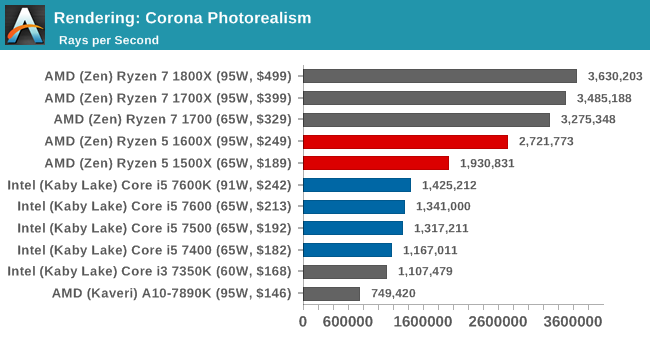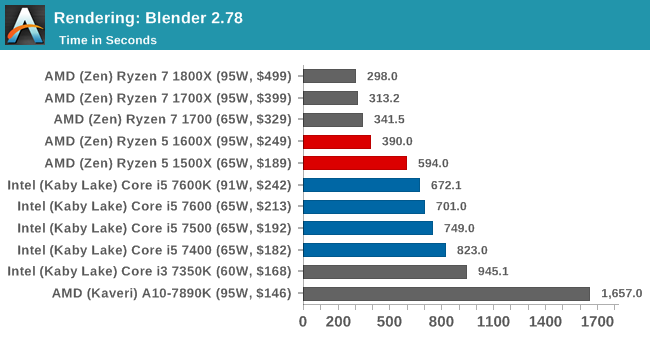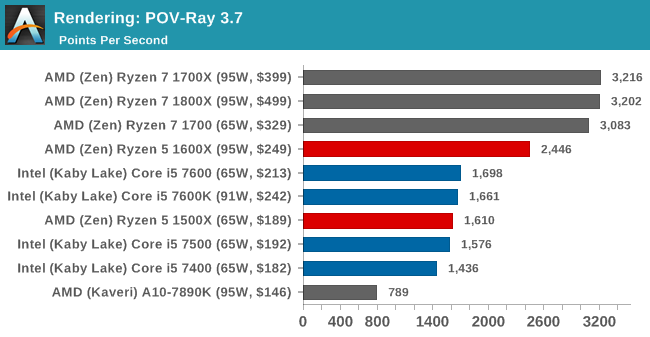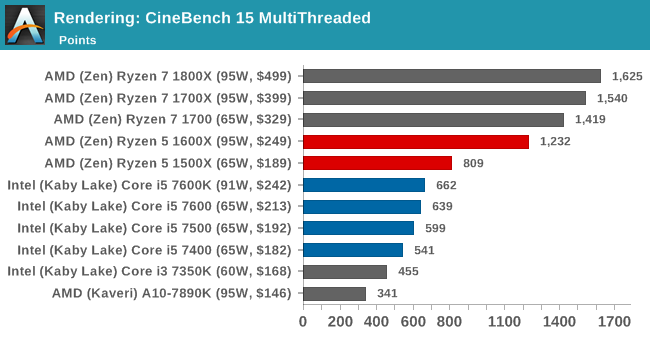The AMD Ryzen 5 1600X vs Core i5 Review: Twelve Threads vs Four at $250
by Ian Cutress on April 11, 2017 9:00 AM ESTBenchmarking Performance: CPU Rendering Tests
Rendering tests are a long-time favorite of reviewers and benchmarkers, as the code used by rendering packages is usually highly optimized to squeeze every little bit of performance out. Sometimes rendering programs end up being heavily memory dependent as well - when you have that many threads flying about with a ton of data, having low latency memory can be key to everything. Here we take a few of the usual rendering packages under Windows 10, as well as a few new interesting benchmarks.
Corona 1.3
Corona is a standalone package designed to assist software like 3ds Max and Maya with photorealism via ray tracing. It's simple - shoot rays, get pixels. OK, it's more complicated than that, but the benchmark renders a fixed scene six times and offers results in terms of time and rays per second. The official benchmark tables list user submitted results in terms of time, however I feel rays per second is a better metric (in general, scores where higher is better seem to be easier to explain anyway). Corona likes to pile on the threads, so the results end up being very staggered based on thread count.
Blender 2.78
For a render that has been around for what seems like ages, Blender is still a highly popular tool. We managed to wrap up a standard workload into the February 5 nightly build of Blender and measure the time it takes to render the first frame of the scene. Being one of the bigger open source tools out there, it means both AMD and Intel work actively to help improve the codebase, for better or for worse on their own/each other's microarchitecture.
POV-Ray 3.7.1
Another regular benchmark in most suites, POV-Ray is another ray-tracer but has been around for many years. It just so happens that during the run up to AMD's Ryzen launch, the code base started to get active again with developers making changes to the code and pushing out updates. Our version and benchmarking started just before that was happening, but given time we will see where the POV-Ray code ends up and adjust in due course.
Cinebench R15
The latest version of CineBench has also become one of those 'used everywhere' benchmarks, particularly as an indicator of single thread performance. High IPC and high frequency gives performance in ST, whereas having good scaling and many cores is where the MT test wins out.















254 Comments
View All Comments
mmegibb - Tuesday, April 11, 2017 - link
Where did you get your info about OC'ing the 1600? I haven't seen much about OC'ing the Ryzen chips, at least in these initial comprehensive reviews. (I haven't searched much either). I still haven't decided between the 7600k and the 1600x, and how the 1600x overclocks will be a factor.haukionkannel - Tuesday, April 11, 2017 - link
All Ryzens in all test have been running between 3.9-4.1 in all owerclocking test. So it does not matter what Ryzen you get. The oc performance is the same. Must be because if the manufacturing proses. This could be a beast if made by intel factories ;)MrSpadge - Tuesday, April 11, 2017 - link
No, such a hard an consistent speed limit is usually by chip design. If it was "just the silicon lottery" there'd be more spread, like you see with Intels.Outlander_04 - Tuesday, April 11, 2017 - link
https://www.youtube.com/watch?v=3VvwWTQKCZsi5 and Ryzen 5 at good OC's
cheshirster - Wednesday, April 12, 2017 - link
People are already bying 1600, it runs 3.8 OC on a box cooler1600X has no room to overclock at all
cheshirster - Wednesday, April 12, 2017 - link
+1600bobbozzo - Tuesday, April 11, 2017 - link
Hi Ian, on the last page,Rise of the Tomb Raider’s benchmark is notorious for having each of its three _seconds_ perform differently
I think that should be 'scenes' not seconds.
Thanks!
mmegibb - Tuesday, April 11, 2017 - link
In the gaming benchmarks, Intel generally has higher average framerates. But, interestingly, in the 99th percentile and time-spent-under-60fps, Ryzen usually tops Intel. To me, this translates into an overall smoother and more consistent game play experience with the Ryzens. Is that right?I've been on Intel processors for years. In fact, my son still is doing heavy-duty 1080P gaming with an OC'd i5-2500k. But, soon I'm going to replace that beloved CPU, and I want to buy a Ryzen just to upset the apple cart and do something different.
I've been disappointed in the Ryzen 7 reviews as far as gaming is concerned. But, this review gives me hope. I'm really thinking that triple the threads of the i5-7600k with only a small loss of gaming performance is the way to go. Especially with DX12 getting more common.
Achaios - Tuesday, April 11, 2017 - link
Αs a gamer, what you are primarily interested in is Single Threaded Performance simply because there's a host of games out there that depend on Single Threaded performance:1. All World of Warcraft versions.
2. All Total War versions.
3. Starcraft II.
4. Civilization games.
...and so on. The OP is just giving you a review tailored to make Ryzen shine whereas in fact it still is an inferior CPU for gaming due to inferior Single Threaded performance.
Very few games use for than 2-4 Cores, so that makes Ryzen largely irrelevant at the moment. It will also be irrelevant in the future too when games will begin utilizing more than 4 cores, because there will be -by then- far better Intel & AMD processors.
mmegibb - Tuesday, April 11, 2017 - link
Yes, forever gaming reviews have hammered the idea that all that matters is single threaded performance.However, as I mentioned, this review shows the 1600x beating the 7600 in 99th percentile and time under 60fps, even in games like GTA V. Those are very important benchmarks for gaming quality perception. You didn't talk to that at all. You just repeated the boilerplate about "single core" that we all know.
Also, I don't think it will be too far in the future when more games use DX12, and that seems to make a big difference.
I think I'm getting a whiff of "intel-fanboy" from your post.